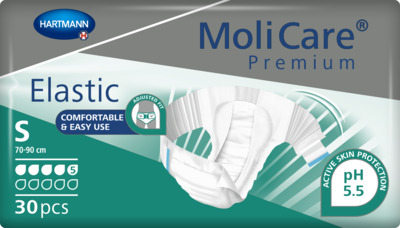Incontinence Advice
Bowel Incontinence Guide
This guide to bowel incontinence explains everything you need to know about what bowel incontinence is and how to manage living with the condition. You can also use our faecal incontinence pads to help you manage this condition.

Introduction
One of the biggest challenges to finding bowel incontinence products for is being able to talk about it. It is embarrassing, and it makes us feel vulnerable. However, incontinence, particularly bowel incontinence, can be a sign that something more serious is happening. It is also something that you should not need to live with. It can seriously affect your quality of life and therefore your overall happiness and wellbeing.
It is time to set embarrassment and vulnerability aside and talk about the issues of bowel incontinence openly. You’ve already searched for this article, so you’ve made an important first step.
What Is Bowel Incontinence?
Bowel incontinence is a loss of control over bowel function. This means that you could pass material from your bowel unexpectedly. This might be something small – like the involuntary passing of gas. However, it can be as serious as the passing of liquid stool (poo) or complete loss of control over bowel movements. You are more likely to recognise the signs and symptoms of urinary incontinence – with a lack of control of the bladder. This is the same – but instead, it is for the bowel and substances coming from the back passage.
There are lots of reasons why bowel incontinence may occur. There can be an injury to the nerves that sense when you need a trip to the toilet. Usually, the stool will press against this nerve and signal that the individual should act. However, injury to the nerves in the rectum or those that control the anal sphincter can lead to bowel incontinence. There are many reasons for such nerve damage – it can be caused by childbirth, or if you suffer from consistent constipation and strain during the process of passing stools. Equally, it can be caused by spinal cord injury or even a stroke.
Learn more about Incontinence during and after pregnancy
What Are The Signs and Symptoms of Bowel Incontinence?
There are symptoms that might signal bowel incontinence in adults. If these issues are happening frequently, that should alert you to potential problems – rather than individual incidents.
You may suffer from:
Diarrhoea
This is loose, watery stools that will appear quickly and with little warning. You will find this difficult to hold in – much more difficult than the more solid stools. This might mean you end up soiling yourself or you could leak stool material when passing wind. This obviously makes everyday life difficult.
Chronic constipation
Although incontinence suggests a loss of control over going to the toilet, it might be a result of poor toilet habits in general. It might be that you do not realise you need to go to the toilet at all. You will then get a build-up of stool in the bowel, which you will interpret as constipation but could also be a lack of feeling in this area.
Passing wind
One of the earlier signs of bowel incontinence is an increase in the amount that you pass wind – and this may smell more than usual. Embarrassing maybe, but also something that you should pay extra attention to should it continue.
Bloating
This is where our stomach may fill up with gas, and you will feel uncomfortable and maybe even feel painful.
Remember you should experience these symptoms regularly, and they should impact on your day-to-day life. It is possible to have one-off incidents due to a virus or a reaction to something you ate. If these symptoms recur in a short period – this is when you should consider if you have bowel incontinence or not.
When Should You Seek Medical Advice?
The biggest problem with bowel incontinence is the embarrassment at the possible examinations you may undergo. Many people do not seek help because they see it as something private or something embarrassing. You need to remember that if this is adversely affecting your life, then you should see your GP. They are used to seeing people who struggle with bowel movement – it is similar to asking a check-out operator the price of cornflakes – so there should be no embarrassment really.
There are two important points to remember when you are deciding whether to go to the GP or not.
- First, it is unlikely to get better on its own. If the problem has persisted for a time, then it is likely to continue and potentially get worse.
- Secondly, it can be treated – and is not something you should just have to put up with. So, go, seek help – it is a sign of strength, not weakness to face such health issues.
If you are genuinely worried that you may never go to see your doctor for anything else ever again – once you have mentioned your bowel habits – then your local hospital may have an NHS continence service, you could access instead.

What Causes Bowel Incontinence?
There are many reasons for bowel incontinence, some of which are serious, but some are not so serious at all. It is best not to presume. The common causes of fecal incontinence why you might struggle with bowel incontinence include:
Impacted stool
This is caused by severe constipation which in turn will cause you to strain and potentially damage nerves and anal sphincter muscle in the anal passage.
Long-lasting diarrhoea
This may be a result of irritable bowel syndrome (IBS) or similar.
Inflammatory bowel disease Conditions such as Crohn’s disease or ulcerative colitis can cause bowel incontinence.
Haemorrhoids
These are commonly known as piles and when severe can result in bowel incontinence.
Colorectal Cancer
Bowel incontinence could be a sign of cancer in the colon – and this is the primary reason why you should treat the symptom seriously and seek medical advice as soon as possible.
Nerve damage
Not being able to feel that you need to pass a stool could be caused by nerve damage as a result of diabetes, spinal cord injury, MS or other similar conditions. This may also have resulted from childbirth, a stroke or spina bifida.
Radiation damage
If you have had treatment for prostate cancer you may consequently suffer from problems of bowel incontinence.
Whatever the cause, please don’t ignore it or self diagnose. Bowel incontinence is a serious symptom and one that could indicate a more severe problem. It is always best to seek medical advice.
How To Treat Bowel Incontinence
The Medical Examination
One of the ways to overcome worries about treatment for bowel incontinence is to explain what happens when you go to the doctors. What will you expect from the professional? If you know the steps that the doctor will take – it is unlikely to be as bad as if you imagine.
When you first go to the doctors, there will be a need for a medical history to be taken and a physical examination to be performed. This physical examination will involve an inspection of your anal passage – and may include the insertion of a probe or a finger to check for nerve damage. When this nerve is pressed the anal sphincter should contract, and your anus should pucker. If this does not happen then your doctor will begin to assess the nature of the problem that you are facing. They may also assess if there any abnormalities – and ask you to bear down as if going to the toilet – to check the rectal prolapse.
You may then need to undergo further medical tests. These tests could include a balloon expulsion test. This sounds torturous – but isn’t. This is where a small water-filled balloon is inserted into the rectum, and you are asked to go to the toilet to expel this. If this takes more than three minutes, then the doctor may suggest a defecation disorder. You may experience a tube inserted up the anal passage to take images of the anal passage or into the colon in its entirety. You may also be sent for an MRI scan.
None of these tests sound particularly pleasant, and it is understandable if you want to avoid them. However, the truth may be that you are putting off simple tests and in return, you may end up needing more complex procedures. It is best to go to the GP as early as possible.

Can It Be Cured?
Bowel incontinence as a condition on its own can be treated, and the symptoms eased with careful management. Therefore, it is highly likely that the medical professionals will be able to offer relief and a solution to potential underlying causes that have resulted in bowel incontinence.
There are lots of ways that the GP can help with this condition – depending on the root cause of the bowel incontinence, let’s break down some of the possibilities:
Dietary changes
Everything that goes into your body impacts on your toilet habits and the consistency of any output. This makes it common sense that the doctor may suggest that you change what you eat – including eating more fibre in your diet. It is also likely you will be asked to drink plenty of fluids – and when they say fluids, they mean water or similarly hydrating liquids. Be careful with tea and coffee that are considered diuretics, which means they have a dehydrating effect.
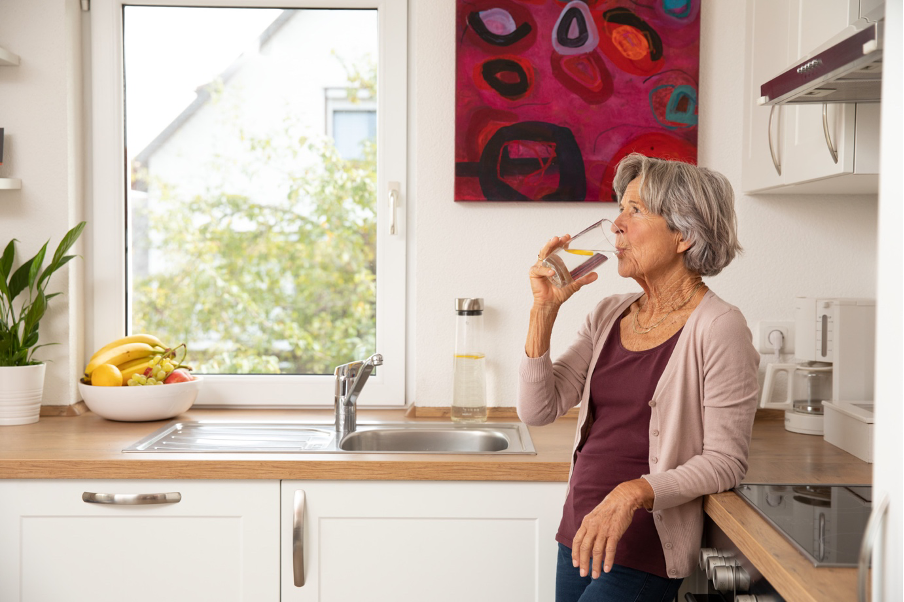
Exercise
If your incontinence is a result of pelvic floor muscle damage then you may be given exercises or physical therapy. The aim of this therapy is to return control to the sphincter and control the urge to defecate. There are some types of therapy that involve the application of devices – such as sacral nerve stimulation – which aims to regulate the sensation in the nerve that tells you when you need to pass stool. We wrote an article about possible sport with incontinence. Take a look here >>

Surgery
If the problem is ongoing and making life difficult and painful – then the doctors may suggest a rectal surgery to correct any underlying problems. This can include a procedure for repairing damage to the sphincter that may have occurred during childbirth. It may mean correcting haemorrhoids or reversing a rectal prolapse. In an extreme situation, the sphincter can be replaced by a device that essentially replaces its function. If the problem is with the colon, as might be the case with something like Crohn’s disease, then there may be need for a colostomy – or a bowel diversion.
The treatment options and management tools for this condition should be reassuring. There are many ways that you can find the help you need – especially if you seek out this support quickly.

What Products Can Help?
While you are going through tests and investigations into the root cause of the problem, you need to manage the condition in the meantime. You will find products that can spare you the embarrassment and the discomfort. Here are some of the products we offer that can help you through this difficult time.
MoliCare Premium Form Stool – HARTMANN Direct
These are large shaped pads that can be placed in your underwear or worn with MoliCare Premium Fixpants to hold any faecal matter and prevent leakage onto clothing. These are purpose designed pads, wider at the back and with standing cuffs to prevent any faecal matter escaping the pad.
MoliCare® Premium Elastic 7 Drops (S, M, L) – HARTMANN Direct
If you’re caring for someone else, we recommend an all-in-one slip product. These products will capture both urine and faecal matter, provide additional security, moving with the body and are easier and more dignified if you are applying them to a loved one.
MoliCare Premium Bed Mat 5 Drops 60x60cm – HARTMANN Direct
You may struggle most at night, and therefore you need some protection for your bed. These bed mats serve as underpads to cover your sheet, protect your mattress and offer the peace of mind needed for sleep.
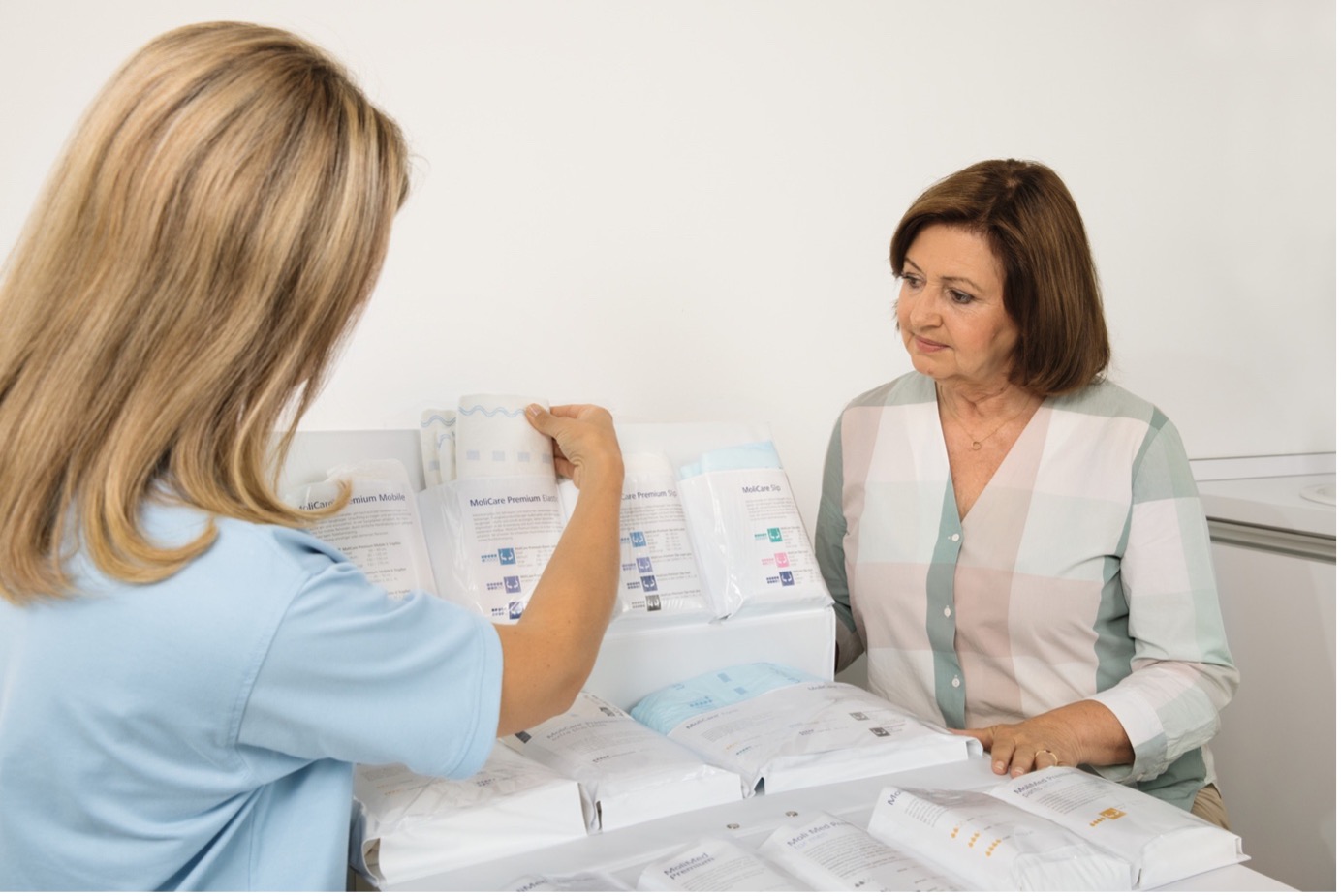
A possible area that goes under explored by some is the impact on the skin when someone suffers with bowel incontinence. There is a need for sensitive cleansing products that are specifically designed for incontinent skin, like MoliCare® Skin Cleansing Foam and barriers creams to protect and soothe such as MoliCare® Skin Barrier Cream. Equally, there are products to help with convenience with cleansing – such as cleansing tissues. All these products help deal with potential problems of discomfort and smells – especially as many of these products are pleasantly fragranced.
Maintaining hygiene is important, especially for those who aren't capable of doing it alone. We wrote an article dedicated to how to maintain hygiene for someone you care for. Click here to read.
We understand the worries that come with bowel incontinence. We know the potential for leakage, for smells, for the discomfort from skin irritation. All the products we design are here to support you until you can get a complete solution and comfort.
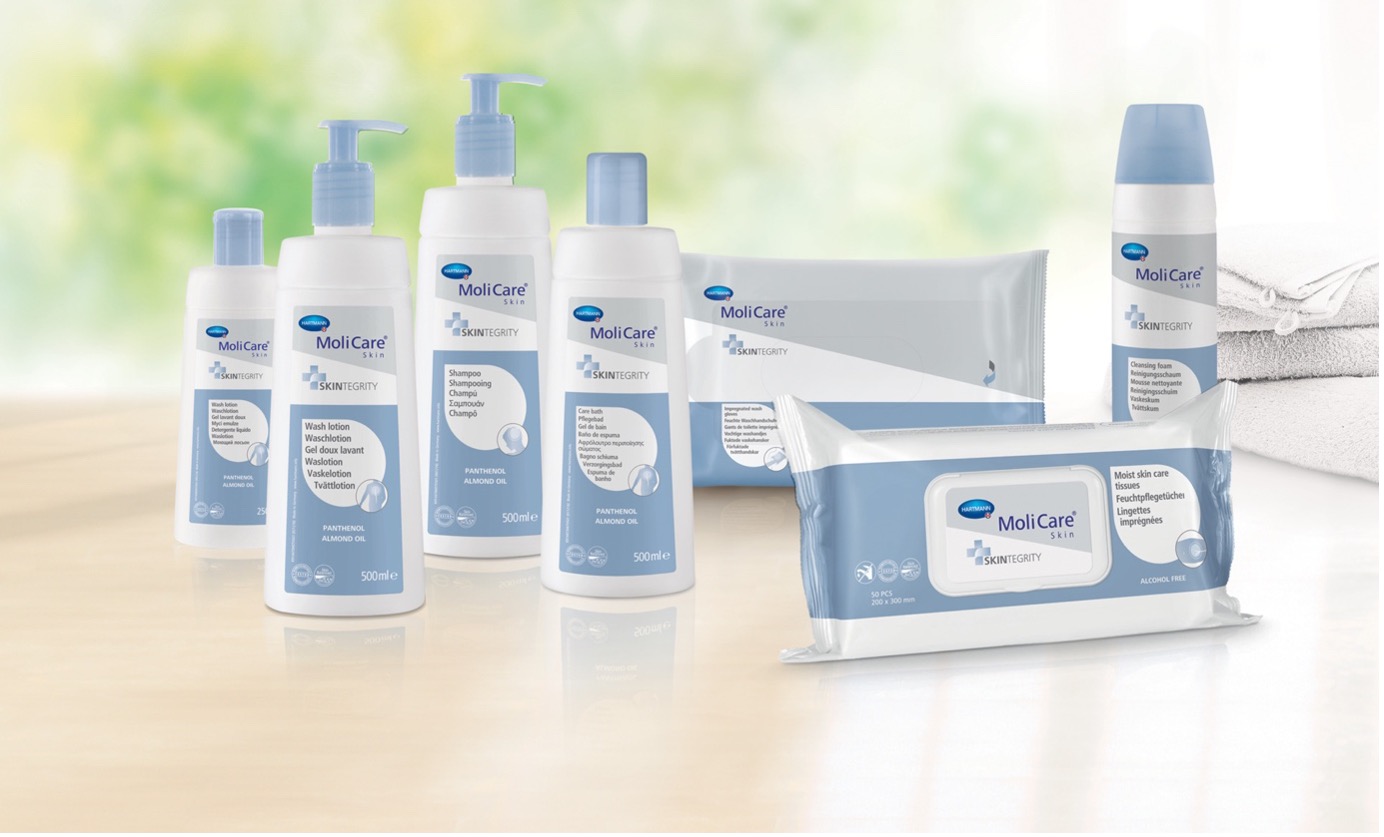
Summary
So, you have come to this article because you sense you have a problem and you are looking for information. Well done, we are grateful for your trust. Getting informed is a great starting point. We take your problem seriously and are ready to help with products we can deliver to you discreetly. It will help with the day to day inconveniences of bowel incontinence.
The products will help with the leakages, the smells and the skin irritations that you are likely to be experiencing.
This is a beginning to solving your problems.
The truth is that you now need to go to the doctors. Remember not to self-diagnose. Remember to not dismiss what you know you are experiencing. It is not pleasant going through an anal medical examination – but it is likely something your doctor does several times a day. The doctor may not even remember that this is odd or difficult for you. They will pull on the gloves and lubricate the finger and then seek to work out why you are experiencing difficulties. It is as simple as that for them – they will not change their mind about you as an individual.
The really good news is that most underlying causes of bowel incontinence – literally almost all of them – are simple to address. You could be given medication, or exercises, or referred for surgery. The treatments are highly successful.
It is always a good day when you can conclude an article on such a message of hope. We hope that this information has helped you to know what to do now – and we look forward to supporting you back to a place of comfort and convenience.
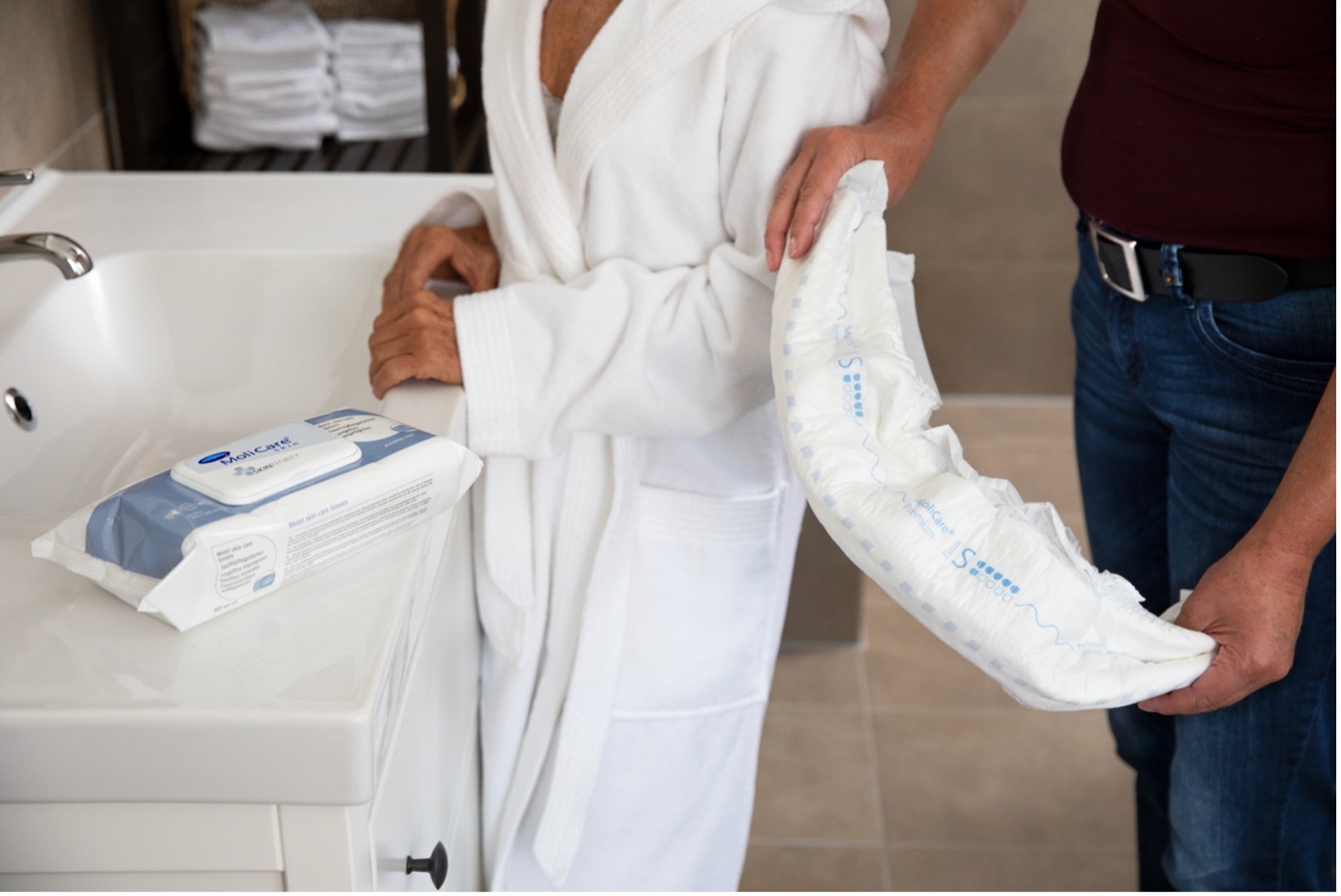
Here's an articles which might interest you:
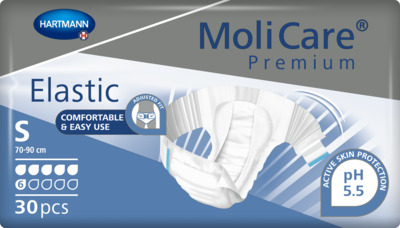
MoliCare® Premium Elastic 6 Drops
<h2>Manage Incontinence with Ease using MoliCare® Premium Elastic 6 Drops</h2> <p>When it comes to managing incontinence, there are many products available to cater to different levels of need. Among these are the MoliCare® Premium Elastic 6 Drop pads, which consist of a large absorbent slip supported by an attached fixation system, commonly known as adult diapers or nappies.</p> <h2>Flex and Adapt</h2> <p>The MoliCare® Premium Elastic 6 Drop Pads, is an all-in-one premium disposable adult diaper featuring an easy-to-apply system that caters to all shapes and sizes of the body. This exceptional product caters to a wide range of incontinence levels, from moderate to severe bladder weakness and/or faecal incontinence. Designed to be worn as an alternative to underwear, these adult diapers provide a secure and comfortable fit, thanks to the elasticated side panels that offer complete mobility and comfort, regardless of whether the wearer is active and independent or bedbound and dependent.</p> <p>Key features of MoliCare® Premium Elastic 6 Drop Pads include:</p> <ul> <li>All-in-one disposable adult diaper suitable for both men and women, designed with two elasticated side panels and two resealable hook and loop tapes.</li> <li>Ideal for moderate to severe incontinence, ensuring reliable protection.</li> <li>Tailored to fit and move with all body shapes, providing maximum comfort.</li> <li>Adjustable fit with ergonomic handling, facilitated by the elasticated side panels and resealable tapes.</li> <li>Crafted from soft, breathable material to maintain skin health.</li> <li>Skin-neutral pH value of 5.5 and antibacterial finish contribute to healthy skin maintenance.</li> <li>Comprehensive leakage protection that prevents moisture, as well as urine and faecal leaks.</li> <li>Convenient wetness indicator allows for easy identification for when a change is needed.</li> </ul> <p>With MoliCare® Premium Elastic 6 Drop Pads, you have the flexibility to choose from different absorbency levels, ensuring secure care for people with varying degrees of incontinence. Maintain the quality of your skin alongside these incontinence products with our <a href="https://www.hartmanndirect.co.uk/skin-care/care-product-for-skin" style="color:#0563c1; text-decoration:underline">care products for your skin</a>.</p> <h2>Choosing your Size</h2> <p>Measure waist at the largest width between the waist and hips. Select the product size based on the below sizing.</p> <p>Small: 28-35 inches (70-90cm)</p> <p>Medium: 33-47 inches (85-120cm)</p> <p>Large: 45-57 inches (115-145cm)</p> <p>Extra Large: 55-69 inches (140-175cm)</p>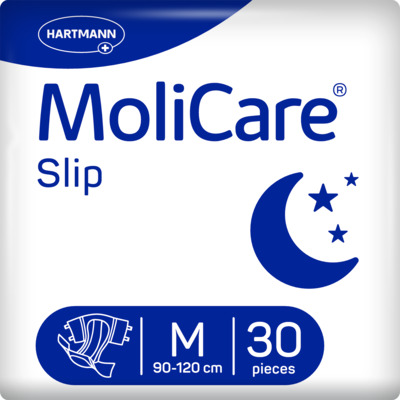
MoliCare Slip for Night
<h2>Low cost adult nappy</h2> <p>MoliCare Slips for Day and Night are an all-in-one brief or adult nappy for both men and women providing reliable protection for moderate to severe levels of urinary incontinence. These slips are also ideal for use for people with feacal incontinence or double incontinence to provide a containment before cleansing.</p> <p>Skin feels dry and comfortable for improved well being thanks to the absorbent core with locks in liquids and neutralises odours. Safe and secure fit close to the body, skin friendly and dermatologically tested.</p> <h2>Choosing your size</h2> <p>Measure the waist at the largest width between the waist and hips and select the product size.</p> <p>Medium: 90 – 120cm</p> <p>Large: 120-150cm</p>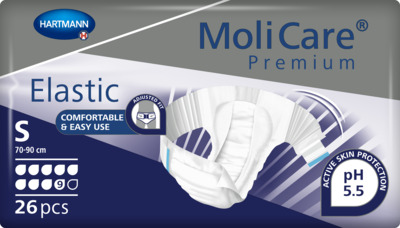
MoliCare® Premium Elastic 9 Drops
<h2>Handling Incontinence</h2> <p>With so many different incontinence products on the market, it can be challenging to figure out which pad would be best fit for you or someone that you know. Fortunately, MoliCare® has recognised this and have produced the right form of premium elastic slips that are comfortable and easy to use. Some key benefits of handling incontinence with MoliCare® slips include:</p> <ul> <li>All-in-one disposable adult briefs with elasticated side panels and resealable tapes.</li> <li>Suitable for moderate to severe incontinence in both men and women.</li> <li>Designed to fit and move with all body shapes, ensuring a comfortable and adjustable fit.</li> <li>Skin-friendly, thanks to its soft and breathable material.</li> <li>Maintains healthy skin with a pH value of 5.5 and an antibacterial finish.</li> <li>Provides reliable all-round leakage protection, effectively locking away moisture and preventing leaks.</li> <li>Features a visible wetness indicator to indicate when it's time to change the product.</li> </ul> <h2>Choosing your Size</h2> <p>Measure waist at the largest width between the waist and hips. Select the product size based on the below sizing.</p> <ul> <li>Small: 28-35 inches (70-90cm)</li> <li>Medium: 33-47 inches (85-120cm)</li> <li>Large: 45-57 inches (115-145cm)</li> <li>Extra Large: 55-69 inches (140-175cm)</li> </ul> <p>MoliCare® incontinence products offer various absorbency levels to cater to different needs. At HARTMANN Direct, we offer a convenient ordering service with fast and discreet delivery right to your doorstep. As we prioritise your convenience and comfort, we provide a price match promise and free delivery on orders over £40.</p> <p>If you need assistance in choosing the right MoliCare® products, our friendly customer service team is available to offer advice. Feel free to contact us at 0800 028 9470.</p> <h2>Shipping & Return Information:</h2> <p>With convenience and comfort considered for all of our MoliCare® products, quality meets a great price match too. Get your order delivered the next day when you need to stock up, and when you spend over £40 with us, you will receive free delivery with these orders.</p>